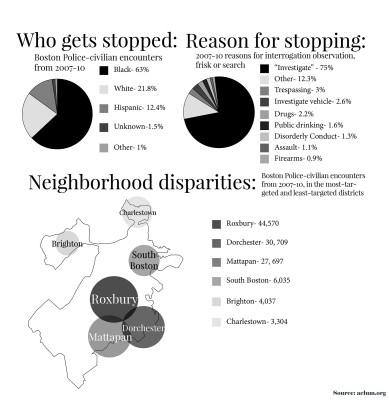The American Civil Liberties Union of Massachusetts called on state lawmakers Monday to pass legislation that would help analyze and address

problems of racial bias in policing, according to a Monday press release.
The legislation, introduced by Massachusetts Rep. Byron Rushing, Massachusetts Sen. Linda Dorcena Forry and Massachusetts Sen. Sonia Chang-Dwould make data collection about police-civilian encounters routine and uniform and make that data available to the public, according to the release.
Christopher Ott, communications director for the ACLU of Massachusetts, said the ACLU wants a more regular release of documents and data pertaining to police-civilian encounters.
“We want them [the police] to release the data that shows what’s really happening in terms of who are they stopping and searching and where in the city and why,” he said. “We want that released on a much more regular basis, which is what these bills which have just been introduced at the State House would do.”
In October 2014, the ACLU released a report called “Black, Brown and Targeted,” analyzing the latest data on police-civilian encounters made available by police. It stated that blacks were subjected to 63 percent of interrogation, observation, stops and searches, even though they make up 24 percent of Boston’s population.
Additionally, the report found when police-civilian encounters occurred, “young black men” were more likely than “young white men” to be frisked or searched, and young black men were more likely to be targeted for repeat police-civilian encounters.
“Boston police made no justification for three-quarters of the stops and searches they did in the data that we looked at,” Ott said. “And all they put for that was ‘investigate person,’ so putting that on the documentation that they file is a lot like putting nothing at all. It’s essentially saying, ‘We felt like stopping this person, so we did.’”
The ACLU is asking specifically that police officers report concrete reasons for stopping someone, Ott said.
Racial bias in policing and police brutality have been on the radars of many Americans since the August 2014 shooting death of Michael Brown, an unarmed black teenager, after a confrontation with a Ferguson, Missouri police officer and the July 2014 death of 43-year-old Eric Garner after he was put in a chokehold by police in Staten Island, New York.
“A key part of what’s going on is that we can feel and express this concern that so many people have had since the Michael Brown shooting and the Eric Garner incident and the aftermath of these things, but we need to do something about them. And that’s what this legislation is about,” Ott said. “These bills are meant to help analyze and address this problem that we see both in the Boston area and across the country of racial bias and policing.”
However, the report sparked significant controversy when it came out, according to the release.
“One of the criticisms of the report that was made was that the data it was based on was old,” Ott said. “Those recent numbers came from 2010. But that’s only because it’s the most recent data the police have made available.”
The ACLU had previously made recommendations to police to address the problems in policing. Matthew Segal, ACLU of Massachusetts’ legal director, said the ACLU had provided the Boston Police Department with recommendations pertaining to police-civilian encounters.
“Well before the release of our report, the ACLU made clear recommendations to police to address this problem: issue body-worn cameras to officers, provide receipts to any civilian involved in a stop, frisk, search or consensual interview and routinely publish data on police-civilian encounters,” he said in the release.
Segal said no policy changes have been made by BPD in response to the recommendations.
Several residents said there is no clear answer to improving race relations in the United States.
Laurie Foreman, 30, of Brighton, said legal action is imperative to properly address the profiling problem.
“It’s definitely an issue, and there needs to be legislation to alter this situation,” she said.
Jeff Foreman, 35, of Brighton, said he wasn’t sure how to go about making a change in the nation’s race issues.
“It’s a big issue in today’s society that needs to be rectified. I’m not sure what can be done,” he said. “I know there are steps to be taken, but I’m not sure how it can be changed.”
Paige Smith contributed to the reporting of this article














